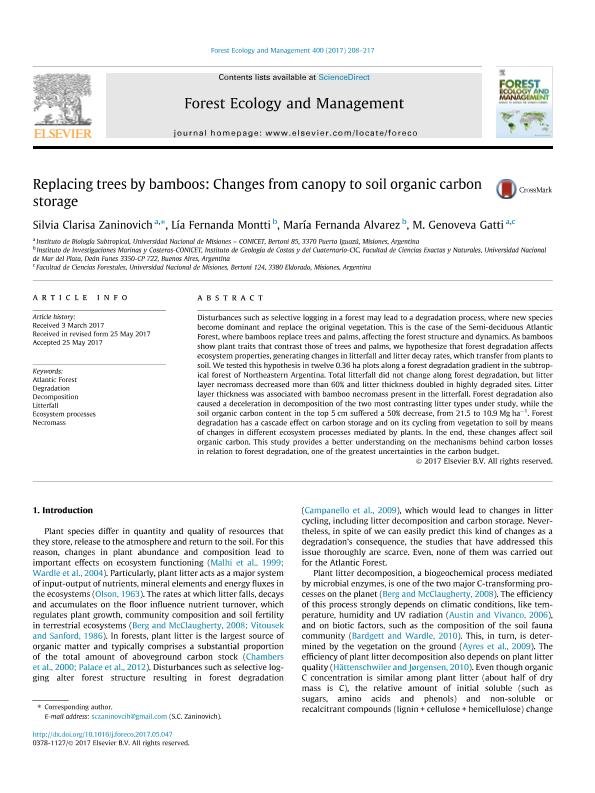Mostrar el registro sencillo del ítem
dc.contributor.author
Zaninovich, Silvia Clarisa

dc.contributor.author
Montti, Lia Fernanda

dc.contributor.author
Alvarez, Maria Fernanda

dc.contributor.author
Gatti, Maria Genoveva

dc.date.available
2018-05-18T21:11:07Z
dc.date.issued
2017-06
dc.identifier.citation
Zaninovich, Silvia Clarisa; Montti, Lia Fernanda; Alvarez, Maria Fernanda; Gatti, Maria Genoveva; Replacing trees by bamboos: Changes from canopy to soil organic carbon storage; Elsevier Science; Forest Ecology and Management; 400; 6-2017; 208-217
dc.identifier.issn
0378-1127
dc.identifier.uri
http://hdl.handle.net/11336/45686
dc.description.abstract
Disturbances such as selective logging in a forest may lead to a degradation process, where new species become dominant and replace the original vegetation. This is the case of the Semi-deciduous Atlantic Forest, where bamboos replace trees and palms, affecting the forest structure and dynamics. As bamboos show plant traits that contrast those of trees and palms, we hypothesize that forest degradation affects ecosystem properties, generating changes in litterfall and litter decay rates, which transfer from plants to soil. We tested this hypothesis in twelve 0.36 ha plots along a forest degradation gradient in the subtropical forest of Northeastern Argentina. Total litterfall did not change along forest degradation, but litter layer necromass decreased more than 60% and litter thickness doubled in highly degraded sites. Litter layer thickness was associated with bamboo necromass present in the litterfall. Forest degradation also caused a deceleration in decomposition of the two most contrasting litter types under study, while the soil organic carbon content in the top 5 cm suffered a 50% decrease, from 21.5 to 10.9 Mg ha−1. Forest degradation has a cascade effect on carbon storage and on its cycling from vegetation to soil by means of changes in different ecosystem processes mediated by plants. In the end, these changes affect soil organic carbon. This study provides a better understanding on the mechanisms behind carbon losses in relation to forest degradation, one of the greatest uncertainties in the carbon budget.
dc.format
application/pdf
dc.language.iso
eng
dc.publisher
Elsevier Science

dc.rights
info:eu-repo/semantics/openAccess
dc.rights.uri
https://creativecommons.org/licenses/by-nc-sa/2.5/ar/
dc.subject
Atlantic Forest
dc.subject
Degradation
dc.subject
Descomposition
dc.subject
Litterfall
dc.subject.classification
Otras Ciencias Biológicas

dc.subject.classification
Ciencias Biológicas

dc.subject.classification
CIENCIAS NATURALES Y EXACTAS

dc.title
Replacing trees by bamboos: Changes from canopy to soil organic carbon storage
dc.type
info:eu-repo/semantics/article
dc.type
info:ar-repo/semantics/artículo
dc.type
info:eu-repo/semantics/publishedVersion
dc.date.updated
2018-05-16T14:45:30Z
dc.journal.volume
400
dc.journal.pagination
208-217
dc.journal.pais
Países Bajos

dc.journal.ciudad
Amsterdam
dc.description.fil
Fil: Zaninovich, Silvia Clarisa. Consejo Nacional de Investigaciones Científicas y Técnicas. Centro Científico Tecnológico Conicet - Nordeste. Instituto de Biología Subtropical. Universidad Nacional de Misiones. Instituto de Biología Subtropical; Argentina
dc.description.fil
Fil: Montti, Lia Fernanda. Consejo Nacional de Investigaciones Científicas y Técnicas. Centro Científico Tecnológico Conicet - Mar del Plata. Instituto de Investigaciones Marinas y Costeras. Universidad Nacional de Mar del Plata. Facultad de Ciencia Exactas y Naturales. Instituto de Investigaciones Marinas y Costeras; Argentina
dc.description.fil
Fil: Alvarez, Maria Fernanda. Consejo Nacional de Investigaciones Científicas y Técnicas. Centro Científico Tecnológico Conicet - Mar del Plata. Instituto de Investigaciones Marinas y Costeras. Universidad Nacional de Mar del Plata. Facultad de Ciencia Exactas y Naturales. Instituto de Investigaciones Marinas y Costeras; Argentina
dc.description.fil
Fil: Gatti, Maria Genoveva. Consejo Nacional de Investigaciones Científicas y Técnicas. Centro Científico Tecnológico Conicet - Nordeste. Instituto de Biología Subtropical. Universidad Nacional de Misiones. Instituto de Biología Subtropical; Argentina
dc.journal.title
Forest Ecology and Management

dc.relation.alternativeid
info:eu-repo/semantics/altIdentifier/doi/http://dx.doi.org/10.1016/j.foreco.2017.05.047
dc.relation.alternativeid
info:eu-repo/semantics/altIdentifier/url/https://www.sciencedirect.com/science/article/pii/S0378112717303365
Archivos asociados
